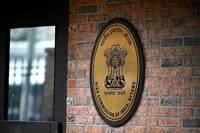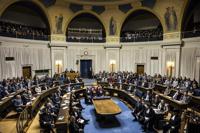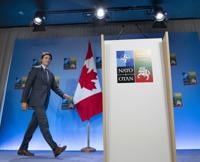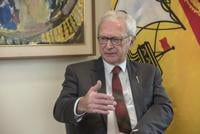WASHINGTON - Canada's ongoing diplomatic standoff with India risks making it an even more tempting target for international efforts that use disinformation to reshape global narratives, a senior State Department official says.
Whether it's restive political factions, grassroots public outrage, economic instability or geopolitical disputes, conflict always makes it easier for falsehoods to take root, said Global Engagement Center co-ordinator James Rubin.
"Any time there is an underlying discontent in a country, the manipulators will use that," Rubin told a briefing Thursday about the centre's new report on China's goals for reshaping the information space.
"Unfortunately, they're getting better and better at it."
Social media now lays bare the divisions that exist in any given part of the world, "and through artificial intelligence and spending money on it, they can develop tailored narratives," he said.
And while Rubin was quick to note he's seen no evidence of China seeking to exploit the Canada-India dispute, "this is obviously an area that is ripe for information manipulation."
The dispute broke into public view last month when Prime Minister Justin Trudeau revealed "credible allegations" of a link between the Indian government and the shooting death in June of a prominent Sikh leader in B.C.
Hardeep Singh Nijjar, 45, a longtime advocate for the idea of an independent Sikh state in the province of Punjab, was killed while at the wheel of his pickup truck by two masked gunmen outside a temple in Surrey, B.C.
India — where Nijjar had long been branded as a terrorist and was wanted in connection with multiple attacks dating back to 2007 — has strenuously denied any involvement.
Rubin acknowledged Thursday that the dispute is a "tricky subject" in the U.S., which has been working to strengthen its ties with India as part of a long-term plan to build a geopolitical bulwark against China in the Indo-Pacific.
And while he hewed closely to official U.S. talking points, urging the two countries to co-operate on an investigation to ensure the perpetrators are brought to justice, Rubin initially called the killing an "assassination," a term he later retracted.
"I meant the word 'murder,'" he said.
"It was clearly a murder, it should be investigated in Canada, it's terrible that it happened, but I should have used the word 'murder,' not assassination, because that has political overtones."
A spokesman for the Indian government acknowledged this week that New Delhi wants Canada to shrink its diplomatic presence in the country, but would not confirm reports that 41 of 62 Canadian envoys could be kicked out by Monday.
Ottawa has said the discussions are ongoing, but it needs its emissaries to remain in India while efforts continue to resolve the standoff.
Global Affairs Canada said in a statement late Thursday evening that "due to security and operational considerations," it was unable to provide details about Canada's current diplomatic footprint in India.
The turmoil has proven a resilient topic in both Washington and Ottawa, both of which had been more focused in recent months on how best to address the global threats posed by Russia and China.
The latter country has aggressively deployed its disinformation campaigns in Canada in recent years, with one particular target — Conservative MP Michael Chong — earning a specific mention in the new State Department report.
Chong, who represents an Ontario riding, testified before a congressional commission last month about his experience, which included a Chinese intimidation plot that targeted the MP and his relatives in Hong Kong in 2021.
Earlier this year, Chong was also at the centre of an effort by Chinese operatives to discredit him with false information, using WeChat, a social media and direct-messaging app popular in the Chinese diaspora.
"The (People's Republic of China) has used WeChat as a channel for disseminating disinformation targeting Chinese-language speakers residing in democracies," the report says.
The network involved accounts linked to state media and China's state apparatus "in opaque ways," and "shared and amplified false and misleading information about Mr. Chong’s identity, background, and political views."
Rubin noted with some irony that China for decades was and remains a fierce guardian of its internal domestic affairs even as it engages in efforts to manipulate the narratives in countries around the world.
"There's nothing wrong with people asking hard questions, or even suggesting outrageous things, as long as it's done in an open, transparent manner where you know who's saying what to whom, and why," he said.
"When the provenance of information is not clear, when we don't know that it's the Chinese government or the Russian government doing something, that's when it's information manipulation."
This report by Ďă¸ŰÁůşĎ˛ĘąŇĹĆ×ĘÁĎ was first published Oct. 6, 2023.








































